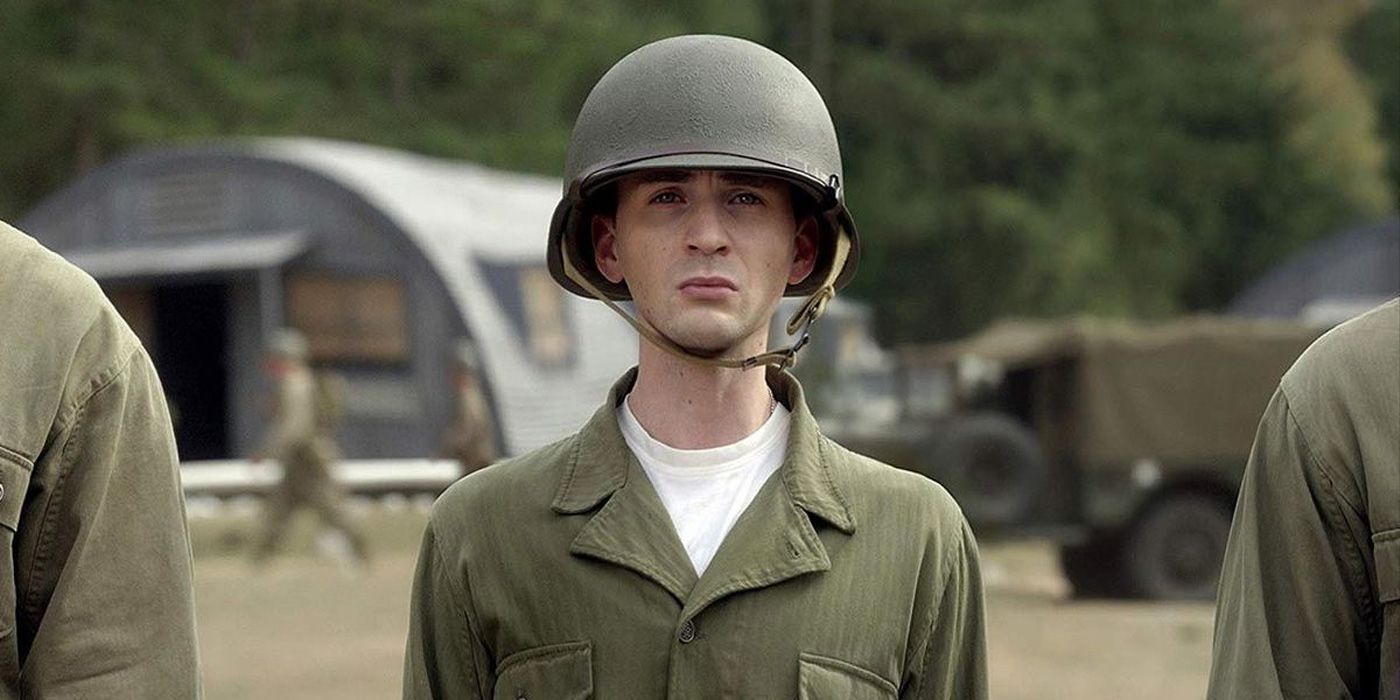As Captain America: The First Avenger turns ten years old this week, it’s easy to take it for granted, or put in the shadow of larger outings like The Winter Soldier and Civil War. And yet it’s arguably the best origin story Marvel has done thus far, and done with a character who doesn’t easily lend himself to the complexities that audiences supposedly demand from their superheroes. The popularity of Batman and the studio hand-wringing over Superman being “boring” have given way to a line of thinking that only dark, complex superheroes can succeed, and certainly one called “Captain America” would be doomed in a climate where characters need to succeed on a worldwide stage. And yet screenwriters Christopher Markus and Stephen McFeely wisely found a way to adapt the character for the 21st century without losing the spirit of his heroics.
You have to remember that Captain America has always been a political character. His first cover famously showed him punching Adolf Hitler in the face, a full year before Pearl Harbor and America actually entering World War II. And yet “America” seems to be inseparable from the character. It’s in his name after all, so the problem is how do you not make him a walking advertisement for jingoism and a nationalistic furor that America is somehow better than any other country?
The film's first answer to that is to push hard on Steve Rogers’ (Chris Evans) humility. The first act of Captain America: The First Avenger is crucial in showing Rogers not shaped by trauma or a singular event, but rather that who he is as a person is someone who wants to get into the fight, but is limited by his physical shortcomings. His heart is truly in the right place—he’s not a violent man or someone who relishes war, but rather his empathy for those dying overseas makes him feel like he needs to stand alongside those risking their lives against evil. This, compounded with other signifiers like his awkwardness with women and his lack of ego, make Steve relatable, but also someone that we as an audience want to protect. The super soldier serum is merely a chance to manifest what’s already on the outside, so that as Dr. Abraham Erskine (Stanley Tucci) puts it, “Good becomes great.”
But the real touch of genius is the scene where Steve and Erskine first meet. Here it is in case you’ve forgotten:
When asked if he wants to kill Nazis, Steve responds, “I don’t want to kill anyone. I don’t like bullies. I don’t care where they’re from.” In a weaker film, this would seem like a wishy-washy statement designed to minimize the harm Nazis did. But in the larger context of The First Avenger and with the throwback earnestness director Joe Johnston constructed, it’s really more of a credo designed to take Steve away from a singular conflict and into a larger one. Again, he’s not someone who relishes violence or has already dehumanized his enemy. Rather, looking at the actions he sees as harmful (i.e. “bullying”), he feels the need to stand up and fight.
The First Avenger then proceeds to keep expanding the conflict so that it’s not really “America, the Uncompromised and Always Good Side” defeating evil foreigners. Rather, it’s the individual of Steve Rogers and his values of humility, kindness, and protection (the shield motif isn’t just a call to his weapon of choice, but how that weapon operates) against HYDRA, a fictitious force that’s coded in the Nazis’ fascism, but allows the story to dodge the messier realities of the Nazis’ ethnic cleansing of Jews and other assorted war crimes. The First Avenger doesn’t dodge Nazis because it’s trying to treat them with kid gloves, but rather the film is wise enough to acknowledge that sometimes you need the shield of fiction so as not to diminish the reality of suffering.
That’s an incredibly tricky tightrope The First Avenger has to walk, and yet the film does it beautifully because it understands how to present Steve Rogers as a human hero first rather than an “American” hero. By purposefully working in broad strokes, Captain America: The First Avenger is able to expand Steve Rogers past his nationalist origins and into a new kind of hero with universal values from the beginning. The character Joe Simon and Jack Kirby created in 1940 was the right hero for that time, a call to arms in a conflict that had already begun. By the same token, the Captain America of the MCU was the right character for his time, and that’s how he was able to win over audiences for the decade to come.

